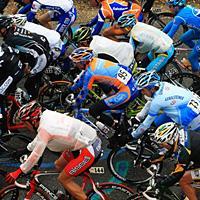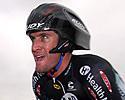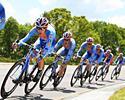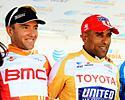
Recently on Cyclingnews.com |
News feature, August 28, 2008
State of the Peloton: North America
The North American peloton* will be undergoing some major changes after the 2008 season. The potential loss of two big teams could produce a sea change of sorts, flooding the market with top talent. Cyclingnews' Mark Zalewski gives a 'State of the Peloton' report, including who is staying, who could be going and who might be growing because of it. In part one of this three-part feature, he delves into the players with the most to gain and lose. Check back for part two, the stayers, and part three the up and comers.
 |
Unlike the European peloton, which recently saw teams sign new title sponsors like Columbia and Saxo Bank, the North American peloton is seeing the opposite occur. Some call it a change, others a market correction – but losing the teams sponsored by Toyota and Health Net, along with the already defunct Symmetrics team, would cause a tidal wave of talent to wash over the domestic peloton in a way not seen in recent years. Notice the word 'teams' above and not 'sponsors' – both of the management companies that actually own the 'teams' are actively looking for replacement sponsors. However, with the US economy clinging onto the bottom of the toilet bowl the task is rather uphill.
Toyota-United's boss Sean Tucker announced the other week that he was releasing his riders from their contracts early to seek other employment for 2009. The statement said the search for a new title sponsor would go on, but clearly not a good sign. Still, Tucker told Cyclingnews the search continues.
"We are working hard and trying to contact some new people as well. We have two very interested parties but there is nothing more we can do with them. They are just waiting to get their budget numbers and then have to decide their marketing budget from that. So we are sitting on our hands with those two folks. "
While he did release his riders from their contracts, he said many of them want to stick it out. Due to UCI deadlines, and likely due to budgets as well, the team will have to remain Continental instead of making the planned jump to Pro Continental, but even that deadline has moved up this year to make things more stressful.
"We have some big things planned for the team and we are going to need more talent. We have a stack of resumes two inches high, from all over the world!"- Rock Racing's Michael Ball is feeling the crush of the buyer's market. |
"We have up until December 10, but we'll have to be a continental team at this point. And that date was moved up too. To go Pro Continental there are minimum salaries. Sure a lot of our guys were already there, but to have everyone at about $40,000 and then some are specialists and have to be contractors, so we have to pay extra to make it about $60,000."
As for his educated guess on the outcome, Tucker gives himself even odds. "In 2005, when I started the team, I called 535 companies that year. And I did that with a lot of research, not just opening up the phone book. We got one company to write a check. I would say today we have called 120 companies. But all we need is one, so I would say 50/50."
The decision to keep going is a tough one, and the lure of getting out while on top is a strong one for Tucker. "There are two thoughts on that. On one hand I would like to go out on top if we have to go out, because we have been the most successful teams in the US in major races."
"But on the flip side, I have real relationships with the riders and they want to stick it out. So if I can get a decent amount have a skinnier program with nine or ten."
 |
Not much better off at the moment is Health Net-Maxxis, the top NRC team the last four years and still counting. The team slimmed down this year operating on much smaller budget relative to previous years as Health Net announced this was to be its final year of sponsorship. Team president and sponsorship director Thierry Attias said that the search has been going on for an even longer time. "We have been searching for 1.5 years because Health Net let us know well in advance," he said. "Health Net is having some internal restructuring and changing their marketing from a B2C to a B2B. Although we've had a fantastic run they are moving on. It's amicable."
"The title sponsor hunt has been crazy in terms of educating and quantifying," he continued. "We are currently in discussions with four title sponsors with varying levels of interest. We have discussed about everything, from changing to adding a women's team, triathlon team, to an event component to make it a more comprehensive marking effort."
But unlike Toyota-United, Health Net-Maxxis has not formally released its riders from contracts to look for other teams. "We are having to push it out to the twelfth hour but the bulk of the riders and staff are committed," said Attias. "The climate is obviously changing with Toyota leaving and we are not so benevolent! But we are about half-way there right now."
Attias also said the tightening of the belt also caused the smaller to bond, which is why they are holding out hope a sponsor is found. "The group we have is really cohesive and we've accomplished a lot because of that even with a smaller budget this year. The riders all know my number though and we've been keeping them apprised of our situation. We have had a lot of near misses. We are hoping to have a letter of intent by September 1. If one is in place then we will start signing riders."
Devil's advocate
Ok, leaving the land of unicorns and fairy godmothers for a moment, let us imagine what would happen if both of those teams could not find a title sponsor and closed their figurative doors. 35 riders, many of whom are quite good and garner big salaries, would be up for grabs on the open market while the others would be left knocking on doors. Which doors and how many would open is the next logical question.
A quick look at the domestic peloton as it stands now in the final part of the 2008 season and entering 2009, it is clear there will not be enough spots to handle the influx of riders. Even considering that a few might be able to land jobs overseas in Europe the same economic conditions that have hit the two biggest teams equally affect the remaining ones. Few teams will be able to expand their programs to include more riders or even to sign a big name at the salary level the rider is making now.
A buyer's market
 |
The two teams in the best positions financially appear to be the Pro Continental (and looking to move upwards) Garmin-Chipotle team and the looking-to-be Pro Continental Rock Racing. Like teams in Europe, Jonathan Vaughters' Slipstream sports found a deep-pocketed suitor in Garmin allowing for a bigger salary cap. However the team is at its UCI maximum roster and would need to step up to ProTour to sign any more riders.
"It depends on whether or not we are a ProTour team next year, or whatever the UCI is going to call it, but your guess is as good as mine with that," said Vaughters. "There aren't so many guys that are coming off of those teams that are really capable or event want to ride in Europe. The only guy that I have a keen interest is Dominique Rollin and that all depends on whether or not I can sign more guys."
As well Rock Racing's owner Michael Ball has seemingly bottomless pockets... since he sews his own. While controversy always seems to surround the team, desperate times call for desperate measures and a paycheck is a paycheck.
Ball said that while it would be unfortunate to lose one or both of the top teams, a positive outcome could be a more balanced peloton in terms of talent.
"With Toyota and Health Net disappearing it evens the talent pool and allows it to be more spread out. It will be more competitive across the board. Those are two great teams and if those guys are spread across the peloton you will see some great racing!"
 |
While Ball recognizes this could be a buyer's market, putting him in a good position to grow his roster as the team attempts the jump to Pro Continental status, he said there are still some issues that make it less cut-and-dry. "I'll try to grab those guys if it works for us, but I'm not sure I can anymore, because they know what I pay!" he laughed. "Unfortunately there is only so much room on my team, and I think some of my guys now will be moving forward with our team."
"I am not looking for guys to get on the cheap and then have bad blood on the back side, I want to keep guys. Also some of those guys have a certain price point and I am not sure if it is a total buyers market for all of them. There was also a lot of trash talking last year at this time and some of those guys are now looking for rides, and it is a little disingenuous for them to talk out of both sides of their mouth."
Ball hinted at some big changes to the team beyond personnel and UCI status for 2009, but that each would be a major part of that. "We have some big things planned for the team and we are going to need more talent. We have a stack of resumes two inches high, from all over the world! It is quite astounding to see how it has grown internationally. And that says to me that this sport can grow and increase the amount of eye balls."
 |
After these two comes the other Pro Continental squad in the States, BMC. Team director Gavin Chilcott said the sponsor situation remains good. "Our title sponsor will be BMC. There are more opportunities for secondary sponsors next year. There was a deliberate choice to have a jersey so free of logos. We gave a lot of thought to how it fit in to the image of the team. So there will be opportunities for sponsors to come onto the jersey that were not there before.
Chilcott said the team is continuing on its planned upward progression and the need for increasing talent to fulfill that goal exists. "There will be some new additions to the roster designed at bringing the sports level up on our team. We are now looking at needing a caliber that is higher. We are getting a lot of interest from good riders all over the world. Itšs too premature to talk about names on the roster at the moment. We are focusing on stage racers and we have some very talented riders who are interested, but we are sticking with our theme of Swiss and North American riders.
One reason the team is able to afford expansion is its continued focus on racing in Europe, which ironically is more reasonable than racing in the US, according to Chilcott. "We donšt need a bigger budget to race more in Europe because the promoters offer assistance over there. Although when we do have to pay for things over there the currency exchange can be painful. But if we were to increase the American calendar it would be very costly."
 |
A possible expansion could come from the Bissell team. Team owners Mark and Cheryl Olson will no longer run the team as the title sponsor's owner and CEO, Mark Bissell, has decided to take over the program outright. "Mark Bissell is going to move forward with the team, owning and sponsoring his own team," said Mark Olson. "Glen Mitchell is going to stay on and be a combination of manager and director. Most of the guys are going to stay as well, but they are still working on that."
"We have had a great season with the riders we have now, so we want to keep that foundation and then fine-tune some other positions on the team," said Mitchell. "We are looking at the California and Missouri-type races in order to have more exposure." His comments are a familiar tune for most of the domestic team sticking around – targeting the major stage races such as California, Georgia and Philly Week and making acquisitions with that in mind.
"Ben Jacques-Maynes and Tom Zirbel were the only domestic pros in the top ten of the [Tour of California] time trial so the aim is to keep those riders and then start looking at someone who can be there at the sprint finishes. We've had a good result with Richard England and his stage win in Georgia but we need more consistency to be there in every finish."
Mitchell also touched on another variable that might keep some good riders from finding a job next season even with teams that might have the budget. "I know there are a lot of riders out there but the rules are reasonably strict with regards to ages and numbers. So I have to be selective even as the sport goes through a bit of a hard time. It is very disappointing to hear that teams are struggling, especially at the top end of the sport. It doesn't make the competition that exciting with fewer teams winning everything."
Additional reporting from Kirsten Robbins. * Only UCI registered trade teams were reviewed for this story.
Continue to part two.
